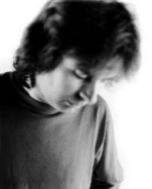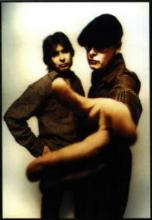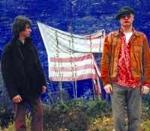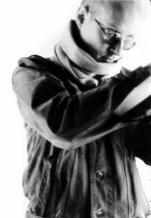
http://www.kindamuzik.net
ernaast
Onze laatste liverecensie.
Onze laatste albumrecensie.
Ons laatste interview.
Onze laatste video.
XTC
There aren't all too many classic bands from the 70s and 80s that are still producing intelligentmusic of a high quality. Thankfully, XTC are a notable exception. Here, they talk about the thoughtsbehind their excellent new album 'Wasp Star (Apple Venus Volume 2)', while Colin Moulding sits downwith us for an exclusive chat...
Tekst: Alex Tobin
Publicatiedatum: 29 mei 2000
 Do you feel that you have a lot more freedom, now that you've severed ties with a major label?
Do you feel that you have a lot more freedom, now that you've severed ties with a major label?
"We do have more freedom, artistically and financially. Artistically, we're able to do what we
want. We used to give Virgin demos, and very often they said "Well, that's OK fellows, but we want
something a little bit more commercial." We didn't seem to be able to satisfy their want, and we
could only bring out what was in our hearts. It didn't seem to hit the spot for them, so I think a
parting of the ways had to come. Now we're able to be ourselves and offer up what's really us."
 Why did you decide to release two contrasting records now?
Why did you decide to release two contrasting records now?
"Yes, they're in quick succession for us. We usually take a few years to get the work together.
We had all of these songs at the end of '97 and wanted to come back into the public eye with
something a bit different, so we divided them up. The first one's got a lot more
acoustic/orchestral-type songs on it. We felt this is the right way to come back into the public eye.
We didn't want criticism levelled at us that we were coming back with what we've always done before,
which is basically to put a series of styles on the album which are diverse. A lot of people think
that's what XTC do, but we're big fans of continuity, like on the albums that were composed for shows
like 'My Fair Lady' and stuff that Burt Bacharach wrote for various soundtracks. They have a
continuity, a flavour about them. That's what we wanted to do. What we did before had too much
diversity on an album. I do think that throws people. You have to limit the palette and give it to
people in a way that has a thread, so you don't lose their attention. That's most important for the
running order of things on an album. That's what we're trying to do, and that's why we divided up the
songs the way they are."
 Was it fun to get the guitars back out of the shed for 'Wasp Star'?
Was it fun to get the guitars back out of the shed for 'Wasp Star'?
"Although we're in our forties, it's not a disgrace to make a racket with an electric guitar!"
 After 'Apple Venus Volume 1', you decided to release an album of demos. Will you be doing the same
for 'Wasp Star'?
After 'Apple Venus Volume 1', you decided to release an album of demos. Will you be doing the same
for 'Wasp Star'?
"That was something for the fans. We haven't made up our mind yet. We don't want people thinking
that it's making money out of fans or anything stupid like that, which of course we're not. A lot of
the fans are interested in it. They really want to find out what's in the notebook that you've got,
that you're working up these songs into a finished thing. They want to see the workings out, very
often like a maths teacher. He'll want to see how you arrived at it. There are a lot of fans out
there who want to see this stuff. We don't want to do too much of it."
 At a certain point in time, there was talk of a box set of demos, called 'Fuzzy Warbles', being
released. How is that project looking?
At a certain point in time, there was talk of a box set of demos, called 'Fuzzy Warbles', being
released. How is that project looking?
"We don't only want to include old stuff, but new stuff that people haven't heard as well, stuff
that we rejected. There is new material around, but we don't feel it's quite good enough to go on the
records. The fans love all that stuff, and I know I would if I was a fan of a band, and I did do -
obviously - earlier on, listening to music, thinking about getting in a band."
 How do you approach songwriting? What comes first to you, the music or the lyrics?
How do you approach songwriting? What comes first to you, the music or the lyrics?
"Usually, the music comes fractionally before the first line that you get. It all starts with
the first line. I don't really believe in having a chorus line that you have to worship. You start at
the beginning. That's what I like to do, and one thing leads to another. You make it to another
section that may be called a 'chorus', but maybe a song doesn't need a chorus. There are no hard and
fast rules. You have to get beyond all this bridge-verse-chorus stuff and just write the song from
the beginning. I write as conversationally as I can, because that's more believable than writing in
any other style. Try and find the canvas first if you can, the first few chords that you like. Ask
yourself: "What feeling is coming through to me? What line would fit on this bit of canvas that I've
got at the beginning of a song?" Let the two develop together. I don't think it's good to let one get
ahead of the other. They have to develop together, so they can go through the twists and turns
together."
 Tell me more about where you get your lyrics from...
Tell me more about where you get your lyrics from...
"I always write about the domestic. That's what I know about. I can't really write about big
issues, because I don't know enough about it, and I'm frightened of getting caught out. You steer
clear of it, you stick to what you know. My songs are always about domestic issues and the home, how
people react in the home, friends, social climbing... this sort of thing. I stick to that. 'In
Another Life' is kind of a relationship/marriage-type song. Although it is about my wife and myself,
it's also about my mum and dad and the difficulties they had in their marriage. They didn't split up
or anything, but they had rows from time to time, as everybody does. It all sounds awfully fluffy,
but it's kind of a "let¹s stick together" song. Everyone's got their little foibles, and married
couples are no different. You can make a go of it. It's a kind of "let¹s stick together" song without
the slush. I don't think there's any sentimentality involved. It's got the minimum sentimentality
attached to it. Liz Taylor and Richard Burton - those were the role models of my parents, not me.
It's not just me and my wife involved in the song. It's kind of married people in general, although
we're in there."
 There seem to be a lot of songs on the new album that deal with relationships and with women in
particular...
There seem to be a lot of songs on the new album that deal with relationships and with women in
particular...
" Andy wrote a song called 'Church of Women'. I think it's in praise of women's efforts to not
undermine man's insecurity. I think men are very insecure. That's why they've treated women so badly
over the years. They're insecure about their position, and it's a kind of song that reaffirms this,
in praise of women. Women are much more generous than men. Men are a pretty cut-throat breed - a lot
of them are - and women do their best to not undermine men, and it's kind of a "Thank You" for
holding it together."
 Are there any new bands out there that you've been listening to?
Are there any new bands out there that you've been listening to?
"I'm supposed to say: "Yes, of course." You're not going to be with it unless you do, but I
can't say there's much around. There was a chap called Martin Newell who brought a couple of albums
out in the mid-90s. He's the nearest that you'll get to the old school of songwriting. Nowadays, a
lot of music is made for the feet, for dancing. We don't always want to dance. A lot of people find a
lot of pleasure just sitting down, listening to pop music. It doesn't have to be slushy ballads. A
lot of people like listening to pop music just sat down, not dancing! It sounds like an old-fashioned
view, I know."
Meanwhile, Andy Partridge and Colin Moulding talk about the making of 'Wasp Star (Apple Venus Volume 2)'...

"Maybe I'm just a frustrated architect."
Andy Partridge often compares his songs to buildings - or children, or coins, or pigs, or sheep, or
whatever image happens to be dancing about in his head.
"I like songs that have hidden corners," he says, running with this latest metaphor. "I like
structures that surprise. I like architecture with hidden niches and folly, buildings that try to
expand and trick and delight. I think architecture and music are pretty closely related."
Colin Moulding, his steady partner in XTC for more than 20 years, doesn't spend as much time
analyzing the blueprints. "I just like good melodies," he says unassumingly.
For 'Wasp Star (Apple Venus Volume 2)' the duo expended more energy pounding in nails than drawing
up sketches, and with reliable old tools - electric guitars - that had been locked up in the XTC
shed during the recording of last year's orchestral 'Apple Venus Volume 1'. Unlike its daintier
predecessor, 'Wasp Star 'buzzes about, packing the sting of crashing drums and even the occasional
muscle-guitar lick.
Case in point, 'Stupidly Happy', a song Partridge erected from a Keith Richards-like riff. "I luckily
stumbled upon the one riff that Sir Keef hadn't found," he jokes, admitting that after being
inundated with violins and flutes he did miss his first love. "It felt great to lean over and pick
up that electric guitar and go, 'Rrrr.' "
"This is definitely an 'up' record," he continues, citing the joys of recording in Moulding's
garage-turned-studio. "The mood was very light, and the album had the least amount of birth problems."
Before 'Volume 1', because of a lengthy contract dispute, XTC had not put out an album since 1992's
'Nonsuch'. After sitting on their new crop of songs for several years and then realizing that the
songs fit nicely into two categories, orchestral and electric, they decided to release their eleventh
and twelfth albums as two separate, but equal, volumes.
"I don't want people to think of 'Wasp Star' as all the tracks that weren't fit enough to go on
'Volume 1' - that's not the case," Partridge explains. "It's two different animals. We had pigs that
we herded into one area, and we had sheep that we herded into another. But they're all four-footed
farm animals with 'XTC' branded on them."
"It's the other side of the coin," he continues, "but it's the same value. It's the price of one
XTC's worth of joy."
This time around, the sheep (or pigs, depending on how you interpret XTCisms) are up to their hooves
in new love, bitter breakup, rebirth and decay.
 'We're All Light', which consists of goofy pick-up lines strung together ("Don't you know we're all
light/Yeah, I read that some place/So you won't mind if I kiss you now/Before indecision can bite"),
finds Partridge happily partaking in a new relationship. XTC fans will take extra joy in knowing that
their hero has redeemed himself, as this is the same woman who inspired 1984's paralyzing,
frustrating 'Seagulls Screaming, Kiss Her, Kiss Her' (whose title subsequently provided the name for
a Japanese pop band). "In 'Seagulls' it was a case of 'Oh, God, why didn't I take the opportunity?'"
Partridge says. "And with 'We're All Light' I say 'I'm gonna take the opportunity.' That song presses
those happy buttons again for me."
'We're All Light', which consists of goofy pick-up lines strung together ("Don't you know we're all
light/Yeah, I read that some place/So you won't mind if I kiss you now/Before indecision can bite"),
finds Partridge happily partaking in a new relationship. XTC fans will take extra joy in knowing that
their hero has redeemed himself, as this is the same woman who inspired 1984's paralyzing,
frustrating 'Seagulls Screaming, Kiss Her, Kiss Her' (whose title subsequently provided the name for
a Japanese pop band). "In 'Seagulls' it was a case of 'Oh, God, why didn't I take the opportunity?'"
Partridge says. "And with 'We're All Light' I say 'I'm gonna take the opportunity.' That song presses
those happy buttons again for me."
The aforementioned 'Stupidly Happy' finds Partridge in similar state of romantic elation. "I was
drunk on love when I found that riff," he says. "I'd had a loving lobotomy."
But Partridge isn't the only one feeling the love (or making swine references). Moulding's 'In
Another Life' is a cheerful, fantastical and moving plea to his wife, whose recent bout with
agoraphobia had kept her indoors: "I'll bring your milk tray from a parachute/I'll play the
Hollywood hunk/You can dye your roots/I'll be your Burton if you'll be my Liz/There might be
flying pigs in another life."
Like some of Moulding's past love ditties ('Ten Feet Tall', 'Grass', 'The Meeting Place') and unlike
Partridge's numerous torturous musical love affairs, 'In Another Life' and 'Standing in for Joe' - in
which the narrator keeps his best friend's wife, er, company - find him singing his breezy melodies
as a cool, confident romantic lead.
"Colin occasionally sees himself as the working-class Casanova," Partridge says, laughing.
Moulding is embarrassed by the suggestion. "Oh, I don't know about that," he balks, but then admits,
"Well, maybe in my younger days. . ."
"He's the handsome one," Partridge continues. "I'm the one who looks like a potato. I get all the
brainy boys who come up and want to talk about nuclear physics; he gets all the women who want to
take him home."
As for the bitter breakup songs, Andy's personal life provided ample fodder for 'Wounded Horse.'
"For me, going through a divorce, I did feel like a wounded horse," he says. "I felt discarded, hurt
and used for purposes of being ridden from point A to point B to win something for someone else."
In the loping, bluesy rant, Partridge parodies his condition by drunkenly slurring his words. "I'm
trying to do the cartoon trucker crying in his beer, or something," he says. "Country songs make an
entire living out of doing this. Nearly every one of them swims around in the maudlin swimming pool,
so I figured I could just dip my toe in with 'Wounded Horse.'"
The seemingly upbeat 'Playground', which is reminiscent of great XTC singles like 'Towers of London'
and 'Senses Working Overtime', also packs a sour punch, with Partridge crooning, "You may leave
school but it never leaves you."
"Everything that happens in school is a template for how it's gonna be," he says. "When you're seven
years old and the girl you're playing with runs off and plays with another boy, that hurts you in the
same way as when you're fortysomething and somebody runs off and leaves you."
 'The Wheel and the Maypole', Partridge's multi-floored celebration of life and death, is among his
most elaborate constructions. "I had a song called 'The Pot Won't Hold Our Love' and a song called
'Everything Decays'", he explains. "And I thought, 'Why the hell don't I try putting one on top of
the other - putting one of these buildings on top of the other building - one of them slightly larger
so that it can form the main body of it and the other one on top as a dome or something.' And then,
as an end section, I thought we would smash the two of them together and make a further section -
almost like a spire on top, made of all the essential strands of the two songs."
'The Wheel and the Maypole', Partridge's multi-floored celebration of life and death, is among his
most elaborate constructions. "I had a song called 'The Pot Won't Hold Our Love' and a song called
'Everything Decays'", he explains. "And I thought, 'Why the hell don't I try putting one on top of
the other - putting one of these buildings on top of the other building - one of them slightly larger
so that it can form the main body of it and the other one on top as a dome or something.' And then,
as an end section, I thought we would smash the two of them together and make a further section -
almost like a spire on top, made of all the essential strands of the two songs."
The song's many twists, turns and hidden stairways make for repeated explorations. Thematically,
the song seems to answer questions Partridge posed in 1986's 'Season Cycle' ("Don't you ever sit
and ponder . . . where we're going in this verdant spiral/who's pushing the pedals on the season
cycle?"). "Everything decays," he sings gleefully in 'Maypole.' "And what made me think we'll last
forever/Was I so naïve? Of course it all unweaves."
"Wow, perhaps I have a very, very slow correspondence with myself, and the mail service takes
almost fifteen years," he says, laughing. "I think you have to adore decay 'cause it's the only
fuel you're gonna get. That's what's gonna make things grow. Roses won't grow until you put shit on
them."
'Boarded Up', the final Moulding offering, is his view of decaying Swindon, the post-industrial
English town XTC have called home since the band's birth. "No bands come to town to play anymore,"
he laments.
Partridge insists that there's more lying beneath the surface: "Colin has been boarded up. [Because
of the contract dispute], we couldn't work, and he had problems with his wife's health. I think he
honestly felt boarded up. I think the song is a great distillation of his feelings."
"It's really just about Swindon," Moulding reiterates, before allowing for the slight possibility
that other elements may have seeped in on an unconscious level.
Of course, like every album since 1982's 'English Settlement', after which Partridge's exhaustion
and subsequent stage fright pulled XTC off the road for good, XTC will not be touring behind 'Wasp
Star'. Partridge even rebukes the notion of someday doing a more-refined tour, like the one his stage
fright-stricken hero Brian Wilson is about to undertake with a symphony orchestra.
 "There're a million things I'd rather do than tour," he says. "I think the driving force behind the
majority of touring is, 'I'll go and show off in front of as many girls as I can, with my gang.' Or
it's, 'We need the money.' The former is ludicrous, and the latter is pathetic, and rather sad."
"There're a million things I'd rather do than tour," he says. "I think the driving force behind the
majority of touring is, 'I'll go and show off in front of as many girls as I can, with my gang.' Or
it's, 'We need the money.' The former is ludicrous, and the latter is pathetic, and rather sad."
Now that all of their seven years' worth of work is seeing the light of day, Partridge and Moulding
don't have any set plans. "I have nothing on the horizon, which is exciting and frightening,"
Partridge says. "We couldn't write another note until we knew that these two beautiful babies were
crawling and running around the nursery. Because we knew they were gonna be good kids."
http://www.kindamuzik.net/achtergrond/xtc/xtc/496/
Meer XTC op KindaMuzik: http://www.kindamuzik.net/artiest/xtc








Deel dit artikel: